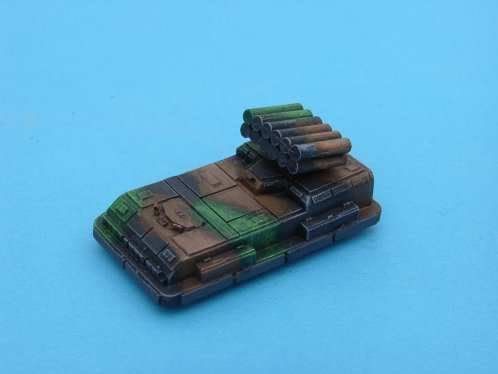Artemis-class Mobile Missile Launcher
You are viewing an old version of this page.

Name/Type: Artemis-class Mobile Missile Launcher
Designer/Manufacturer: Confederation Defence Industries
Combat Role: Mobile Artillery
Crew: 2 (Driver + Gunner)
Length: 10 Meters
Propulsion: Repulsorlifts / Hover Engines
Speed: 240 Kph.
Shield Rating: None.
Hull Rating: 220 RU
Weapons: 12 CCA JL-8 General Purpose Launchers.
Special: 8 Mark IV Sentry Remotes, Active Camouflage, Non-Energetic Reactive Armor.
Description: The Artemis is little more than a Hermes sans weapons and troops; those being replaced by a twelve tube general purpose launcher block and an ammunition magazine respectively. The result is a moderately fast artillery speeder with a versatile and hard hitting ordinance. Generally, this artillery piece travels in the company of other vehicles or troops; providing anti-aircraft and long-range strike capabilities for them, while receiving support against smaller opponents such as infantry and smaller speeders, which the Artemis is ill-equipped to dispose of at close ranges. Because the Artemis rarely enters close-range combat, it is expected that they will have few casualties and repairs needed than other vehicles.
Technical Descriptions:
Relative Cost: Average
Cost: The Artemis-class is a modification of the Hermes, and as such is intentionally designed to be easy to produce, modify, and repair; much like the Unity Program ships. The frame, basic systems, and propulsion can all be manufactured almost anywhere where even the smallest industrial infrastructure exists or can simply be replaced with civilian landspeeder parts. The only expensive equipment on the Artemis is the photoreactive armor and some of the sensors. Because it shares most of its parts with the popular Hermes, it is found in widespread use across the Confederation.
Speed: Average
Engines: Engines occupy almost a third of the Artemis’s chassis. The engine layout and equipment is the same as the Hermes, but the weight of the ammunition and the general purpose launchers have slowed the speeder down considerably. Its repulsor engines, often civilian landspeeder models, make it faster than most tanks currently being used throughout the galaxy, though there are a few older tanks such as the S-1 Firehawke which actually are faster than it. More interesting are the inclusion of auxiliary hover engines, which grant the Apollo a higher altitude and the ability to penetrate theatre shields. If the repulsorlifts fail, the hover engines are capable of moving the tank around at a reduced speed and much quieter as well.
Shield Rating: Nonexistent
Shields: Shields don’t exist on this craft. Instead, power normally expended on them was transferred to power everything else, particularly the countermeasures and targeting equipment.
Armor: Very High
Armor: The Artemis retains the same armor as the Hermes, which makes it a very sturdy vehicle. Its armor is as thick as an AT-ATs armor, is probably its greatest asset. Handheld blasters and smaller caliber projectiles barely scratch the hull. Smaller laser and blaster cannons do little damage to it as well. In order to even moderately be efficient in destroying a Artemis, heavy projectile and explosive weapons are needed. Like other CDI vehicles, the Artemis incorporates Non-energetic Reactive Armor to lessen damage from projectile weapons such as shells or missile. And photo-reactive fibers (like those utilized with the Confederate Army’s Camou Scout Armor) to seamlessly conceal the vehicle visually in all terrains. Ceraglass is used to cover the slits, providing both excellent protection and vision for the driver and the gunner.
Weapons: Average
Weapons: The most noticeable feature on the Artemis is the twelve tube general purpose launcher turret mounted on the chassis’ rear, and what sets it apart from other artillery vehicles. TheCCA JL-8 General Purpose Launchers] CCA JL-8 can effectively act in any number of roles, such as a short-range indirect fire unit, an anti-aircraft weapon, or a long-range assault weapon, if it is provided with the proper ammunition. Thus, the Artemis-class is notorious for its versatility and unpredictability of its in role in battle, sometimes filling the roles of an anti-aircraft unit to an anti-armor unit simultaneously. While it appears powerful on paper, the use of the CCA JL-8 has several glaring drawbacks. The foremost of these being that each launcher must be manually reloaded after firing (which exposes the crew to danger and results in a slow rate of fire). In addition, the vehicle does not have any other weapons, making it particular vulnerable during this reloading process (especially since it would have to be stationary for reloading).
Fire Control: Almost all weapons are ineffective if they cannot be effectively targeted or their targets cannot be found. To this end, the Artemis is equipped with an advanced targeting computer which can track and target twelve targets simultenously. In addition, it can also plot out alternate flight paths for individual missiles launched by the JL-8 to make converging and diverging attacks as needed. As with all other CDI vehicles, the Artemis carries a typical array of targeting sensors, mostly EPRs but also such devices a Novaless Soni-Optics Target Imager, also used on the Paladin II, and an exceptionally powerful Infrared Receptor. In addition, it is aided by eight Mark IV Sentry Remotes, which act as forward observers.
Test Thread: Confederation Armour Test Thread